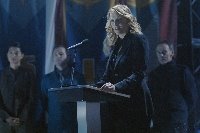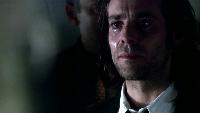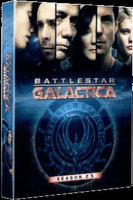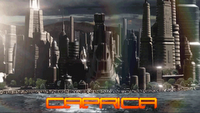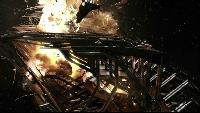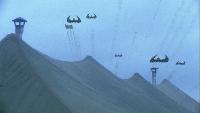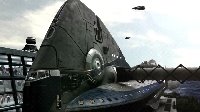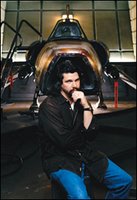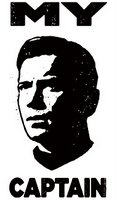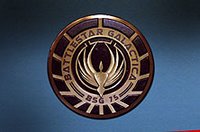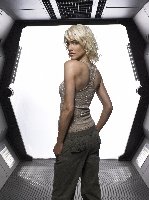
Source: Battlestar Magazine
Transcribed by
GiorgioWith the return of Caprica Six and a whole new storyline, Tricia Helfer has once again got her work cut out in the third season of Battlestar Galactica.Season three of Battlestar Galactica is going to be amazing according to Tricia Helfer who plays the sexy, humanoid Cylon Number Six. Battlestar Galactica, The Official magazine, caught up with her in the middle of shooting episode nine, The Passage.
“Well, there has been a lot happening so far this year,” she says. “And I think the fans are going to be blind-sided, excited and crazy – everything all at once.”
Season three picks up four months after season two left off. Season two, of course, wrapped up with the Colonists having settled on New Caprica, under the barely competent leadership of President Gaius Baltar. The timeline then jumped forward an entire year, to the day when the remnants of the Colonial Fleet were rediscovered by the Cylons. “I think that was a huge surprise for everybody,” says Tricia.
The first episode of season three starts with another jump forward in time, about three or four months after the Cylons, alerted to the presence of the Colonial fleet by the nuclear explosion aboard Cloud Nine, arrived at New Caprica and took over the planet.
“As with any drama, it wouldn’t be interesting if there was peace, would it? The first couple of episodes really delve into what has been happening during the last year on New Caprica,” she says.
“You also see a little bit of what is going on with Caprica Six who is living with Baltar aboard Colonial One, which is of course grounded on the planet. You start to see problems that they have been having in the last few months.”
“It’s always been a bizarre relationship,” Helfer says of the connection between the character of Caprica Six and Gauis Baltar (James Callis). “There genuinely is love and respect for each other, but it’s in a world where nothing is safe and they’re two different species. It’s a love/hate relationship. They depend on each other, but they also don’t fully trust each other.”
RESISTANCE
Not surprisingly for a show that has never shied away from exploring the darker side of life. Battlestar Galactica tackles some contentious issues that are relevant to today’s world. “There is a human resistance movement on New Caprica, like there was on Caprica, but it starts to get a little darker,” Helfer reveals.
“The show deals with issues of suicide bombings and who is in the right in these instances,” she says. “Even the humans are fighting among themselves – is this right, is it wrong?”
Even though the Cylons are ostensibly the bad guys on the show, sometimes the writers like to turn the tables on the viewers. “I think that ultimately we want the audience to question and sometimes feel that the Cylons are perhaps in the right,” she says. “Then they do something that makes you go, ‘wow.’ The humans are the good guys.”
So, what has her character been up to? “In the first few episodes, it’s basically Caprica Six that we first saw again in Downloaded [season two, episode 18], who was the original Number Six that had the affair with Baltar. She was in the finale of season two – one of the ones who got Baltar to surrender.”
With President Baltar aboard Colonial One, Caprica Six is one of the Cylons who rules over the planet. “Essentially, you know, it was Boomer and Caprica Six who really made the Cylons come around and think that maybe what they had done had some flaws and wasn’t right.” Helfer says. “So they really want to try and work something out with the humans.”
Cylons making peace with humans? Helfer dismisses any suggestion that this might be a ruse on the part of the Cylons. “No, they really, honestly do, and you know that’s going to be easier said than done,” she says. “Throughout the first 10 or 11 episodes, you see everybody’s perspective on it, and you see Caprica Six and Boomer’s thoughts kind of turning against them. We start to see dissension in the ranks, within the Cylons.”
For fans of the Cylons, a great deal is going to be revealed about their ships, their society and them as individuals, which will shatter any notions that they are a monolithic entity. And digging deeper into the Cylon psyche will reveal a world tht is utterly alien to humans.
“We see what life is like on a Cylon base ship and the differences between the humanoid Cylons and humans,” Helfer says. “You start to see how their moralities are different and also their customs and some of the things they can do.”
Season three will introduce a new Cylon model called the Hybrid. The Hybrid is a half-way stage between the old metallic Cylons and the new organic models, a kind of missing link. It builds on the concept of a half machine, half organic creature first seen in episode five of season one. You Can’t Go Home Again in which Kara discovers the Cylon Raiders have living, breathing organic tissue inside them.
The Hybrid is the embodiment of the Cylon basestar. Human looking from the torso up, the Hybrid’s lower half merges into the basestar and is connected to all the critical systems on the ship. “The Hybrid essentially is the ship,” Helfer says. “The ship, like the raiders, are a living machine and have organic material. It is less human than the humanoid Cylons and it confined to one room.”
REVOLT?
Any suggestion that the Cylons are, as a species, single-minded in pursuit of their objectives is scotched in season three. Ideally, Cylon society works on the basis of consensus, but as Helfer reveals, “We start to see how some Cylons are starting to take a little bit too much control. Really, the Cylons are a unit, that is, they collectively decide what to do. But there’s a certain Cylon that takes it upon himself or herself to overrule and that ultimately does not work out to her advantage, or his advantage.”
One of the surprises of season three is that Cylons are far more complex, psychologically, than had previously been revealed. “We discover that they have, certain things that they cannot discuss,” Helfer lets slip. “We delve into the remaining five Cylons out of the 12 models that we don’t know yet, and we discover that the Cylons don’t know who they are either. They have inhibitions against talking about them or discovering them.”
There is even the suggestion that Cylons are capable of doubt. While not exactly a new Cylon character (she made her first appearance in season two, episode eight, Final Cut), D’Anna Biers [played by Lucy Lawless] plays a huge role in the Cylon storyline in season three.
It’s not clear whether she is a renegade or a Cylon who is losing her faith, or both, but she and Caprica Six have a stormy relationship that changes into something else as the season progresses.
She says working with Lucy Lawless who plays D’Anna Biers, has been a great experience. “I didn’t really get to know her that well last year because although we worked together on Downloaded, prior to that I think I was in one tiny scene as Number Six with her and Baltar when she first come aboard Galactica as a reporter,” she says. “But it has been fun to get to know her and work wit her on the show again.”
And she reveals, “D’Anna Biers and Caprica Six really do have quite a storyline throughout the first 10 or 11 episodes.”
Fans of Number Six, the version of Cylon model six who is manifested in Baltar’s head, will be pleased to hear that she comes back in a big way, to continue coaxing and vexing Baltar by turns. “in the first few episodes, it’s predominantly Caprica Six that is around, but then Number Six begins to make her appearances again – essentially guiding Baltar like she used to,” says Helfer.
This coincides with a new attitude toward Baltar, which Caprica Six begins to develop following their decampment from New Caprica and her return to the Cylon base star. “Baltar comes with us. He is now a traitor to the humans and he doesn’t really have a place in either world,” she says. “The Cylons don’t trust him and the humans think he’s a traitor, but he finds himself on the base ship.”
Caprica Six begins to turn away from Baltar as she learns more about him. “She has sat down with everyone else and discovered that maybe she’s put too much respect and faith into Baltar,” she says.
The complexities of this relationship between Baltar the man and Caprica Six the machine takes a few more twists and turns before they end up back in a three-way relationship with D’Anna Biers… but not before Caprica Six and D’Anna torture Baltar for information.
As if Baltar wasn’t enough to complicated her life, Caprica Six also has the matter of her strange and tense relationship with D’Anna Biers to contend with. It starts with them not trusting each other and ends with D’Anna, Baltar and Caprica Six in a three-way relationship, but as with all things in Battlestar Galactica, everything may not be what it seems to be.
“I don’t know, because we haven’t filmed that part yet, but I don’t know if it is going to turn out to be manipulation on the part of Caprica Six to get D’Anna into trouble or if it’s legitimately a relationship that they have begun,” she says. “We are kind of in the middle of the story right now.”
But before they get to that part, there is the matter of torturing Baltar, a key sequence in season three that is a turning point in the relationship between D’Anna and Caprica Six.
“They start out at odds with each other. They have differing opinions but then there’s a particular scene which brings them around and you see Caprica Six going to D’Anna and saying, ‘I don’t really trust Baltar anymore and I think you have been right all along’,” she says. “Caprica Six convinces D’Anna to torture Baltar for information, so they do torture him quite intensely. Then Number Six comes into the picture again and tries to help Baltar through the pain.”
This isn’t the first time we see Number Six in season three. “A couple of episodes before that she teaches him more about projection than Caprica Six does. Baltar end up being able to sort of project himself,” she says. “ Of course, we don’t know if this is because he’s a Cylon himself or if it’s just his own abilities, because he has always fantasized about six in a different environment.”
The character of Six, in her many guises, has played a pivotal role in the show from the very beginning, first coaxing Baltar into bertraying the Colonies, then later as the spirit in his head that whispered advice and then later still as the several physical manifestations of Six.
Is it difficult playing the different Sixes? “It is pretty easy to keep Number Six different because it is obviously written where nobody else can see her in the scene and Number Six is quite a bit more seductive. I chose to make Caprica Six a little bit more real, more grounded. With Number Six it’s fun to slip back into her and play out the seductive or powerful intimidating side,” she says.
Despite her role in making Baltar betray the Colonies and his subsequent deceptive behaviour, Helfer doesn’t see Number Six, as she exists in Baltar’s head, as a dark character. “I think they, the audience, responded to the Number Six in his head in the mini-series as sort of this light thing in amongst this really dark story,” she says. “So that may have played a role in why in the first season in particular and most of the second season it was predominantly or basically Number Six in Baltar’s head.”
And of course, season three sees more of a role for Caprica Six, building on what was extablished in the second half of season two. “Those storylines have to be altered, you have to grow from there or they start to get tiring after awhile,” she says. “There is only so many times that Number Six can whisper in Baltar’s ear before you say,’Okay, here’s Number Six again.”’
Seeing more Caprica Six in the beginning of season three is a way to, “change the character up a little bit”, she says. “And then it’s fun when Number Six comes back again, with different edge. I deliberately played Caprica Six and Number Six quite differently, but they start to find common ground again in the third season when Caprica Six starts getting a little harder on Baltar and starts pulling back a bit.”
VIRTUAL CYLON
Another revelation in season three about Cylons is their ability to project their own environments around them, and these ‘projections’ are very real.
“Like Baltar’s visions of Number Six in his fantasies, back in his house or in different scenarios – while he is in fact in a room aboard the Galactica – the Cylons can do this and they call it ‘projection’. They can project whatever environment they want for themselves and they can share projections,” Helfer explains. “So Caprica Six sees a forest and another sees a cathedral. They can also see themselves inside the base ship that the Baseship [itself] is very plain.”
Filming these scenes is technically difficult. “You have to film it in a room in the basestar, then in a forest and then… From whomever’s point of view the discussion is coming from, that is where you are.”
All of which makes it ambitious for a TV show. “The scene I’m doing tomorrow is the forest part, and the cathedral part of the scene we have already done, a week ago, in the base ship,” she says. And yet the extra effort that goes into filming these scenes is worth it, she adds.
 Source: The Daily Globe
Source: The Daily Globe
